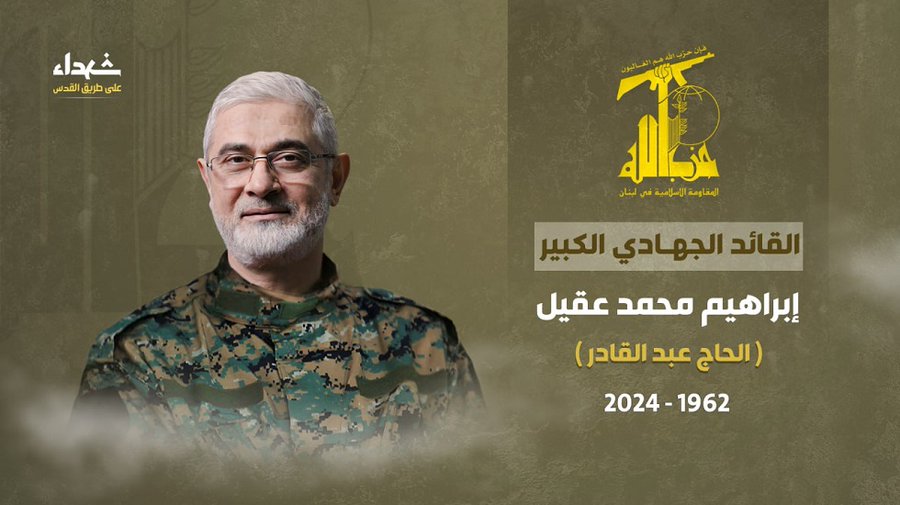On September 20, after an unprecedented cyber attack targeting approximately 3,000 Hezbollah operatives, Israel delivered another blow, killing Ibrahim Akil and about ten other high-ranking commanders of the “Radwan” force, Hezbollah’s elite military unit.
This operation targeted a senior terrorist responsible for the deaths of hundreds of Israelis and Americans since the 1980s.
The assassination followed a speech by Nasrallah in which he threatened to prevent the return of tens of thousands of Israeli citizens evacuated from the northern border during the war.
According to Israeli security sources, this strike is part of a broader effort to pressure Nasrallah into two choices: enter indirect negotiations with Israel or face a protracted military campaign, likely to end in a costly political settlement.
Though Nasrallah has not yet made a decision, he is reportedly consulting with Iran’s leadership on his response. However, Iran is reluctant to escalate the situation into a full-scale regional war between Israel and Hezbollah.
Operation Details
The operation to assassinate Akil and other top Hezbollah commanders took only a few hours. Israeli intelligence had uncovered their gathering in an underground apartment in Beirut’s A-Dahiyah neighborhood.
With political approval, two F-35 jets launched four missiles at the site.
The Biden administration announced it had no prior knowledge of the attack.
Israeli Chief of Staff, Hertzi Halevi, remarked after the operation, “The Hezbollah commanders we eliminated today had planned the October 7th attack on the northern border for years. We found them, and we will find anyone who threatens Israeli citizens.”
Hezbollah later confirmed that Ahmed Wahbi, acting commander of the “Radwan” force, was also killed in the strike.
Background on Ibrahim Akil
Akil was wanted not only by Israel but also by the U.S. In 2015, Washington designated him as a terrorist and offered a $7 million reward for information on him. Akil was responsible for the 1983 attack on the U.S. Embassy in Beirut, which killed 63 people, and the bombing of the U.S. Marine Corps base the same year, resulting in 241 American casualties.
Since the start of the war, Israel has assassinated five senior Hezbollah commanders, including Fouad Shukr, the organization’s chief of staff, Ibrahim Akil, Wissam al-Tawil, Taleb Sami Abdullah, and Mohammad Naama Nasser, all of whom held key military roles.
From a military perspective, Nasrallah is now left with only Ali Karki, commander of Hezbollah’s southern region, and Talal Hamiya, head of Unit 910, responsible for overseas terrorist operations.
Impact on Hezbollah
Israel’s successful campaign has largely decimated Hezbollah’s military leadership, leaving Nasrallah with only his political leadership and the Jihad Council.
His inner circle still includes Sheikh Naim Qassem and Hashem Safi a-Din, head of Hezbollah’s executive council.
Israel has demonstrated deep penetration into Hezbollah’s ranks, gathering intelligence on its top commanders.
Despite Nasrallah’s directive banning the use of mobile phones within the organization, Israeli intelligence continues to gather crucial information through alternative means.
Hezbollah is increasingly concerned that Israeli intelligence is compromising its communication networks, including an optical fiber network set up by Iran.
Israel’s technological superiority is evident, with drones, cyber capabilities, and even security camera systems playing a critical role in its intelligence efforts.
Despite Hezbollah’s attempts to revert to traditional methods of communication, Israel appears to maintain an edge, aided by its network of agents in Lebanon.
This network reportedly benefits from the discontent among Christians and Sunni Muslims in Lebanon, exacerbated by the country’s severe economic crisis.
Conclusion
While the ongoing assassinations have not altered Nasrallah’s strategy, they are seriously impacting Hezbollah’s operational capabilities and morale.
The organization now faces a difficult predicament, knowing that Israeli intelligence holds a significant advantage.
Nasrallah is likely weighing his next steps carefully, aware that any misstep could lead to even more devastating blows from Israel.




